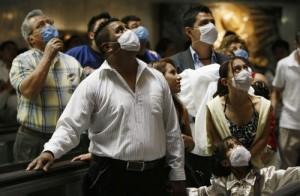The Fatigue Epidemic
Jul 02,2015
What is Fatigue?
We experience fatigue as three different dimensions: mental, physical, and emotional. Mental fatigue is what we feel after exerting ourselves cognitively, using the knowledge and skills in our brains to solve tasks. It may be a simple task of sorting shapes by color like in the typical Cognitive Psychology experiment or it could be a more complex task of putting arguments together in a paper. Physical fatigue is often what we refer to when we say “I’m tired:” the depletion of stored energy to power our limbs. Emotional exhaustion is perhaps most difficult to define because it often affects us physically and mentally as well. It is the fatigue that stems from stress as well as social demands, like when you have to smile even though you are not happy.
How Fatigue Affects Us
As aforementioned, there are personality, mental, and health-related variables involved in fatigue. Catastrophizing, a condition in which one imagines the worst-case scenario in possibly negative events, is linked to physical fatigue as well as physical symptoms like pain which are also not attributable to a medical condition. Even milder forms of catastrophizing, like keeping irrational and harmful beliefs, are linked to fatigue. In addition, those lacking in emotional stability as a personality trait are more at-risk for experiencing severe fatigue alongside symptoms of depression and anxiety.
Physical exhaustion increases when you’ve had a fattening meal and when your sleep cycle is disrupted or irregular, while mental exhaustion increases when you are dehydrated and in an overheated environment. Emotional exhaustion occurs when you face stressful situations and have a difficult time coping. In turn, you may make costly errors in driving, lose track of what you are doing, or lash out at your family as a result of loss of the ability to regulate your emotions. These factors have paramount implications for people who have a full-time job while studying, especially those who work the night shift at their jobs or pull all-nighters. At the same time, variables like the environment are also at work, so it is important to pay attention to the conditions in which you are doing something.
How to Fight Fatigue
Fortunately, there are ways to reduce all types of fatigue. There is evidence that histidine, an amino acid found in meat, can reduce the effects of sleep disruption and fatigue. Different sources report different levels of histidine in foods, but there is a consensus on game meats like deer, whale, and wild boar containing significant amounts as well as pork, ground beef, soy protein, and egg whites.
Rumination, the act of thinking persistently about something that went wrong, has been shown to increase stress and therefore emotional exhaustion. It has even been implicated as a culprit in sleep disruption, so this activity should be halted at its start. Studies show that trying not to think about something actually makes you think about it more, so try instead to wait until the persistent thought passes on its own because we are the ones who give power to those thoughts by prolonging them. Specifically, try to disengage from other responsibilities when you are dealing with one of them; do not worry about your classes while you are at work and instead trust that you can handle it later. Dealing with one thing at a time will significantly reduce the fatigue that stems from rumination. As for bedtime, sleeping is for resting and not ruminating, so try to let go of your responsibilities for that time as well.
Finally, studies have shown that your attitude is crucial to fatigue management. Recovery self-efficacy, how confident you are that you will benefit from resting, should be high. Not only should you not ruminate while you are resting but you should also believe that you will recover from fatigue better if you take this time to rest. Taking time to have fun outside of school and work is one way to rest and has also been effective in reducing fatigue. Everyone has his or her personal struggles and responsibilities, but we can all manage them and have plenty of energy to spare if we reclaim our diets, thoughts, and attitudes.
References
image credit Nelly Deutsch
Grillon, C., Quispe-Escudero, D., Mathur, A., & Ernst, M. (2015). Mental fatigue impairs emotion regulation. Emotion, 15(3), 383.
Hadjicharalambous, M., Georgiades, E., Kilduff, L. P., Turner, A. P., Tsofliou, F., & Pitsiladis, Y. P. (2006). Influence of caffeine on perception of effort, metabolism and exercise performance following a high-fat meal. Journal of sports sciences, 24(8), 875-887.
Hursel, R., Rutters, F., Gonnissen, H. K., Martens, E. A., & Westerterp-Plantenga, M. S. (2011). Effects of sleep fragmentation in healthy men on energy expenditure, substrate oxidation, physical activity, and exhaustion measured over 48 h in a respiratory chamber. The American journal of clinical nutrition, 94(3), 804-808.
Ilies, R., Huth, M., Ryan, A. M., & Dimotakis, N. (2015). Explaining the Links Between Workload, Distress, and Work–Family Conflict Among School Employees: Physical, Cognitive, and Emotional Fatigue.
Kangas, M., & Montgomery, G. H. (2011). The role of cognitive, emotional and personality factors in the experience of fatigue in a university and community sample. Psychology & health, 26(sup1), 1-19.
McHill, A. W., Melanson, E. L., Higgins, J., Connick, E., Moehlman, T. M., Stothard, E. R., & Wright, K. P. (2014). Impact of circadian misalignment on energy metabolism during simulated nightshift work. Proceedings of the National Academy of Sciences, 111(48), 17302-17307.
Oerlemans, W. G., Bakker, A. B., & Demerouti, E. (2014). How feeling happy during off-job activities helps successful recovery from work: A day reconstruction study. Work & Stress, 28(2), 198-216.
Sasahara, I., Fujimura, N., Nozawa, Y., Furuhata, Y., & Sato, H. (2015). The effect of histidine on mental fatigue and cognitive performance in subjects with high fatigue and sleep disruption scores. Physiology & behavior, 147, 238-244.
Park, Y., & Sprung, J. M. (2015). Weekly work–school conflict, sleep quality, and fatigue: Recovery self‐efficacy as a cross‐level moderator. Journal of Organizational Behavior, 36(1), 112-127.
Watson, P., Whale, A., Mears, S. A., Reyner, L. A., & Maughan, R. J. (2015). Mild hypohydration increases the frequency of driver errors during a prolonged, monotonous driving task. Physiology & behavior, 147, 313-318.
Qian, S., Li, M., Li, G., Liu, K., Li, B., Jiang, Q., ... & Sun, G. (2015). Environmental heat stress enhances mental fatigue during sustained attention task performing: Evidence from an ASL perfusion study. Behavioural brain research, 280, 6-15.
Zoccola, P. M., & Dickerson, S. S. (2015). Extending the recovery window: Effects of trait rumination on subsequent evening cortisol following a laboratory performance stressor. Psychoneuroendocrinology, 58, 67-78.





